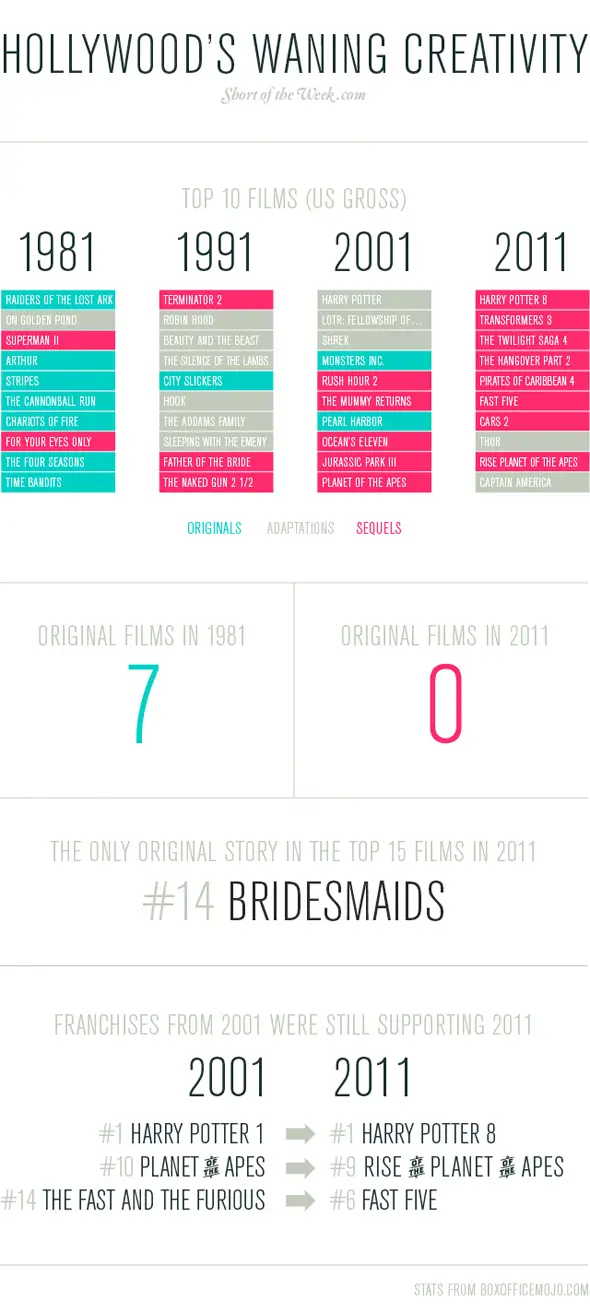The following infographic has been shared around the web many times over. Many have taken these numbers for proof that creativity and originality is waning in Hollywood. Let’s see what it has to say:
Originally from Short of the Week
While it looks like sequels have definitely become more popular by 2011, original ideas already weren’t that big anymore already in 1991, when adaptations reigned. People often already hate on remakes long before they’re even released (e.g. RoboCop… and did you know they’re going to do a new Honey, I Shrunk the Kids?), and movie sequels sometimes are only poorly constructed derivatives. Even if the sequels and remakes are good, maybe even better than the original, one could argue they’re not particularly creative because they reuse an old idea.
On the other hand: are increased amounts of sequels, adaptations and remakes truly a sign of decreased creativity? The creation of every type of script, every type of movie requires at least a decent amount of creativity – even the really bad ones. It’s definitely very hard to adapt a book or other format to the screen. Reinventing and modernizing old movies, like RoboCop, is hard. It requires loads of creativity. Original stories take a lot more time to develop; they’re much harder to create, but I wouldn’t necessarily say they require a lot more creativity.
Furthermore, if there were anyone to blame, it’s not just Hollywood, but we, the audience, are to blame too. These numbers show not just Hollywood’s activity, but our activity as well. Apparently, we’ve come to love sequels in particular considering the continued success of for example the Harry Potter film series, the Pirates of the Caribbean series, and the Planet of the Apes series (but haven’t we always, what with the Indiana Jones and Star Wars series?). We can’t seem to get enough of them, because we keep returning to the cinemas whenever a new sequel is released. Honestly, I can’t blame us. Fun stories with great characters are appealing. Harry Potter has stuck with us for many years now, already long before the films were even released. Moreover, Harry Potter was meant to be a long-running film series, as mandated by the books – you can hardly squish 7 books into one film. As for the rest, they’re fun! So why not?
It gets bad when Hollywood makes blatant use of our loyalty when they, in fast succession, produce sequels that have a bad plot and make the characters do very uncharacteristic things, which has happened for the The Pirates of the Caribbean series, in my opinion. In that case, I heartily disapprove. But in general, I don’t see a real problem with adaptations, sequels, or remakes, and don’t equal them with lesser creativity.
But do originals still stand a chance? Yes, they do. What this infograph does not show are the many successful original ideas that 2011 had: here’s the box office overview of 2011. They may not have reached the top 10, but for example, Rango, Horrible Bosses and Super 8, did very well, especially if you consider they were competing with movies and stories people were already familiar with. People are more prone to go and see exactly because of that pre-existing familiarity. The psychology behind these numbers is a lot more complex than this infographic would suggest.
So all in all, I wouldn’t say this infographic is proof of declining creativity, or that originals don’t stand a chance in Hollywood anymore. If anything, it shows that the audience just loves on-going stories. It’s the same reason why good TV shows have become so popular – we want more of, for example, Frank Underwood, Dexter and the Seven Kingdoms, too. Whether the screen is suitable for this type of long-running series is a whole other can of worms.
What do you think: are adaptations, sequels and remakes less creative than original stories? Do originals still stand a chance in Hollywood?
Should long-running film series stop releasing for cinema, and move to a TV format, instead?
Share your thoughts in the commens – and as always, don’t forget to share this article with your social networks if you enjoyed it! ^_^
Does content like this matter to you?
Become a Member and support film journalism. Unlock access to all of Film Inquiry`s great articles. Join a community of like-minded readers who are passionate about cinema - get access to our private members Network, give back to independent filmmakers, and more.
